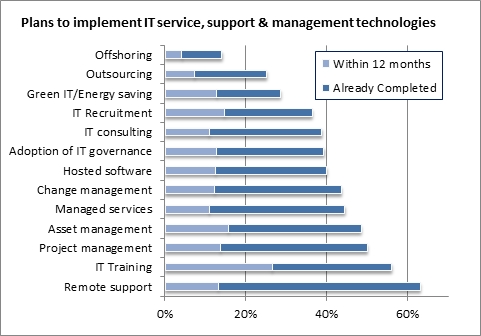Skilling up for the battles ahead

When it comes to IT support, it seems training is the biggest work in progress for companies in Australia and New Zealand.
Just 30 per cent of the companies responding to the ZDNet IT Priorities 2011 survey said they have adequate IT training in place — a further 26 per cent see it as a priority over the next year. For smaller companies (up to 100 seats), this is the most pressing IT services initiative by far, while for larger companies (500+ seats) asset management and recruitment are seen as almost as important.
The survey also gives us a clear idea of where the IT jobs will be next year. Twenty-one per cent of bigger companies see IT recruitment as an aspect of IT services to be implemented over the next 12 months, whereas the same can be said for just 10 per cent of smaller companies.
So what is the focus of these smaller companies? As far as IT services are concerned, "not a lot" seems to be the answer. Aside from training, most of the IT service categories (shown in the chart) will be implemented by less than 10 percent of respondents.

(Credit: Phil Dobbie)
Hosted software is a great example. Fourteen per cent of the larger businesses have it on their to-do list over the next year, with a further 39 per cent having already implemented it. Yet only 10 per cent of smaller businesses plan to implement it (with 23 per cent saying it is already in place). In other words, 53 per cent of the big companies have it or will soon, compared to just 33 percent of small companies. Yet the benefit often given for hosted software is that it is easily implemented and offers big company solutions to smaller businesses. Obviously the message hasn't got through yet, or the smaller companies are too constrained to implement change.
In fact, change management is, in itself, a low priority for smaller businesses. Only 22 per cent say their change processes are complete or in-train, compared to 78 per cent of bigger businesses. We see a similar scale of difference when we look at asset tracking and project management.
It's possible that there's a level of discipline and strategic direction missing in the IT departments of smaller companies. That makes them slower to adopt to newer IT services, even if the benefits for them could be more immediate.
But bigger companies aren't exactly embracing change, either. They are much more focused on housekeeping — like recruitment, training and asset management.
All the signs seem to indicate that companies are focused on keeping skills and assets in-house. Even though we're told this is the era of outsourcing and managed services, our respondents aren't racing to adopt it. Amongst companies big and small there's no difference — just 7 per cent are looking at outsourcing in the next year, and less than 5 per cent are planning to offshore any of their IT services.
The reason is clear: it's the economy, stupid! Change can be risky, and with rumblings of another global financial crisis on the horizon, it's easy for strategists to say "Let's do more of the same". Keeping it in-house is akin to maintaining your own war-room for the battles that lay ahead.
It's likely that vendors are going to need to win more trust before companies will open the lead-lined doors and let outsiders in to help with the strategy.
To download a copy of the IT Priorities report for 2011, please click here.